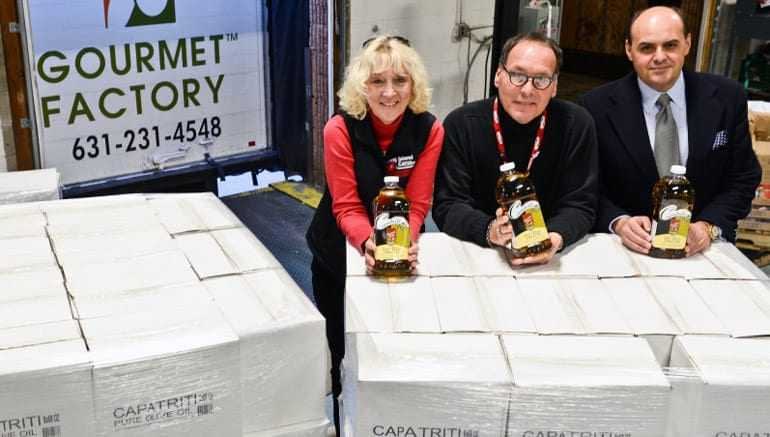
One can never be too sure of anything in this old world, but an end may well be in sight to the legal troubles arising out of marketing pomace oil as pure olive oil by Kangadis Food, Inc. under their Capatriti brand, as well as those of the company’s principals, Aristides, Themes and Andromahi Kangadis and Kangadis Family Management LLC.
In its first-ever legal action against an olive oil company, the North American Olive Oil Association (NAOOA) sued the makers of the Capatriti brand of oil last year, claiming that The Gourmet Factory falsely sold olive pomace oil as “100% Pure Olive Oil.” The Capatriti brand used to account for more than 15 percent of the olive oil market in New York, New Jersey, Connecticut and other states, according to the NAOOA.
Olive pomace oil is a refined product extracted from the byproducts of the first pressing, the leftover olive pits and pulp, using high heat and chemical solvents. “Olive pomace oil is not allowed in any grade of olive oil under any standard in the world,” said Eryn Balch, executive vice president of the NAOOA.
On December 10, U.S. Bankruptcy Court in Central Islip, New York is expected to approve a $2 million settlement of last year’s $261.6 million consumer class action suit. And earlier this week, Judge Rakoff of the United States District Court of the Southern District of New York set out his reasons for his October 23, 2014 order granting Kangadis Family Management LLC summary judgment on their motion to dismiss an action by lead plaintiffs Ebin and Jenkins to pierce its corporate veil.
Had the plaintiffs’ action been successful, it could have led the way to finding the three family members personally liable for the $261.6 million. It was this claim that initially drove Kangadis Food, Inc. into bankruptcy earlier this year.
Judge Rakoff found that the plaintiffs in the class action had produced “no competent evidence from which any reasonable juror could conclude that defendants used their alleged domination of Kangadis Food Inc. as a means to accomplish the fraud.” Such domination is required under New York law in order to pierce a corporate veil, and find the principals of a corporate entity personally liable for the actions of the corporation.
New York law has a two-pronged test for veil-piercing: First, it must be shown that “the owners exercised complete domination of the corporation in respect to the transaction attacked,” and, secondly, “that such domination was used to commit a fraud or wrong against the plaintiff which resulted in plaintiff’s injury.”
With regard to the second prong, it must be established that “the owners, through their domination, abused the privilege of doing business in the corporate form to perpetrate a wrong or injustice.” No such abuse could be found on the part of the Kangadis family members and no evidence was found that Kangadis Family Management LLC “exercised any control or discretion over KFI regarding the transaction at issue.” The corporate structures of Kangadis Food, Inc. and Kangadis Family Management, LLC. therefore remained intact.
The attorneys for the customers are asking the Court for $1.9 million in legal fees and expenses: $10,000 each to the two named plaintiffs, Eben and Jenkins, and up to $50 each for the remaining members of the class. Such class actions are becoming increasingly frequent in the area of food labeling.
Kangadis, operating under Chapter 11 protection, recently announced it added the Shaw’s supermarket chain as a customer. Shaw’s is one of the oldest continuously operated supermarkets in the United States with roots dating to 1860, and 155 store locations throughout five New England states, the statement said.







